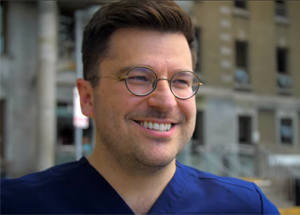In this issue, we present the story of LC, a medical student who experienced psychological harassment during one of his clerkship (externat) rotations.
Can you tell us more about your experience?
“It happened in my General Surgery rotation during clerkship. I was a student alone with the staff and a resident in the consult team. I had heard that the staff had a weird sense of humour and that he sometimes went overboard. Although I was prepared, at the same time, I didn’t expect it. He would make jokes repeatedly about my culture and the fact that I did not read or write my mother tongue. Jokingly, he called me illiterate publicly on several occasions. He also made fun of me openly when I suggested a management plan for a patient that I had seen. He would also quiz me persistently and make inappropriate comments when I did not know the answer. He went as far as to criticize my parents, out of the blue.”
How did you feel when it happened?
“I was bothered by it but he is a big shot in the hospital where I was doing my rotation so I let it go at first. I thought that it would pass but it didn’t. I felt shocked that he would dare to say such things. Feelings of injustice and unfairness came to mind when I realized that this was unacceptable. You start to feel the anger and frustration and you feel powerless as he is a big shot because of his seniority in the hospital.”
What did you do? Did you report it to your faculty?
“First, I spoke with my parents and my best friend but I still felt uneasy about the whole situation. My Osler Fellow [mentor] had advised our group to write the situation out before acting on our feelings and send it to ourselves or her in order to have a dated copy and to make a third party aware of the situation. I texted her with a few examples asking her if I was overreacting and she answered me right back saying that it was completely inappropriate and almost abuse. She advised me to email the Assistant Dean of the Office of Student Affairs of my University which I did with detailed information about the situation and cc’ed my Osler Fellow and my clerkship site director.”
Did you receive any support or feedback from your faculty?
“The Assistant Dean of the Office of Student Affairs answered me within 24 hours with different options. The next day, I went to see the clerkship director who undermined the situation by saying that the doctor was like that with everybody and that being reassigned was not an option. I felt betrayed because she dismissed my situation and I felt like she did not want to advocate for me and that I was stuck with that doctor. I went back to my clerkship director with a printed copy of the email from the faculty. She was reluctant but agreed to reassign me.”
Do you know what happened to the doctor after you reported the situation?
“I was told that the staff would be reassigned but I don’t know what happened. He sent me an email but I never opened it because he broke our professional relationship and I had no respect for him as a supervisor so I did not want to know what he had to say. He disappointed me. I just wanted to move on and put it behind me.”
Did it affect your experience of that particular rotation?
“Before starting the rotation, even though I was not interested in surgery, I was still excited to see different things and learn about them. Because of this whole ordeal, the center of my rotation became the fact that I had to protect myself and keep myself out of trouble. I was not there anymore for the experience so I definitely missed out on exposure of surgical cases.”
Did you find it easy to report it?
“Maybe the fact that surgery was not the specialty that I wanted made it easier to report it. The biggest factor was the fact that my university advertizes and sensitizes students a lot to harassment and what to do about it. My mentor was also very helpful and resourceful. I felt supported by the Faculty as they were efficient to move things forward. However, I have to admit that it is hard for us students to get past the hierarchy and stand up for ourselves.”
Did your experience make you question your career choice?
“It did not make me question my decision to go into medicine because I had already done other rotations that went well and had good physician role models so if anything, it made me want to change this for future students and reminded me not be like that with my future students.”
What would be your advice to students who are also victims of harassment during medical school?
“As students, the evaluation is always on our minds because we want to get into residency. This staff was known to be like that with other students. Why didn’t any of them report anything? I guess some people are less bothered by this attitude and some people try to rationalize it. I said enough is enough. If you don’t stand up for yourself, no one will. When I started clerkship, I told myself two things: always put patients’ interest first and keep your personal integrity. We tend to have an individualistic view when confronted with a colleague who is being harassed, but I think we should be more united.”
Who would have thought that medical students could be victims of psychological harassment? Yet, it is more common than we imagine. The Quebec Federation of Medical Students Wellness Survey conducted in Spring 2011 found that 19 % of surveyed students reported that they had been victims or witnesses of harassment1. It is only by being informed that we can recognize it and do something about it since “[i]t has important effects on the psychological wellbeing of the bullied and harassed person in terms of future performance, career choice, and retention within the profession2.”
The Canadian Federation of Medical Students gives the following tricks to follow if you are a victim of harassment: speak up, keep notes (what happened, when, where, how often, who else was present, and how you felt about it) and report it3.
Here are useful resources concerning harassment and mistreatment for each Quebec university:
McGill University
- Student affairs: Student mistreatment
- Student and medical affairs : Have I been mistreated?
- Key ressources for learners in distress
Université Laval
Université de Montréal
Faculté de médecine : intimidation et harcèlement
Université de Sherbrooke
- Soutien en cas d’harcèlement ou d’intimidation
- Algorithme sur l’intimidation et le harcèlement (PDF)
References:
1. Plaisance M. Quebec Federation of Medical Students Wellness Survey conducted in Spring 2011. Surveyed 32% of clerks in Quebec.
2. Wood DF. Bullying and harassment in medical schools: Still rife and must be tackled. BMJ 2006; 333:664–5.
3. Canadian Federation of Medical Students Anti-Harassment Policy Statement (30/08/2005).
 Carolina Capelle
Carolina Capelle
McGill University










